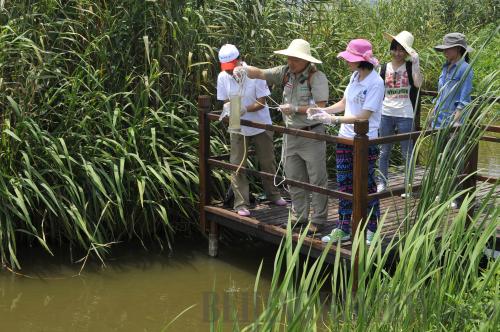|
 |
|
FIELD WORK: Journalists from Beijing and Shanghai examine water conditions near the source of the Huangpu River in the Dianshan Lake in Shanghai on June 15 (LU PENG) |

The Rio+20 UN Conference on Sustainable Development in Rio de Janeiro, a 20-year follow-up to the 1992 Earth Summit, provided a historic opportunity to define pathways to a sustainable future—a future with more jobs, more clean energy, greater security and a decent standard of living for all. It aimed to carry forward the established agenda and forge ahead into the future.
"Rio+20 will be one of the most important global meetings on sustainable development in our time," UN Secretary General Ban Ki-moon said ahead of the conference.
A UN initiative
The concept of "sustainable development" first appeared in the 1980s. It was based on both the self-reflection of the international community on the history of human development and its comprehensive appraisal of practical problems in economic development and environmental protection.
The UN made an important contribution to global sustainable development in November 1983, when the World Commission on Environment and Development was established within the UN framework. In 1987, the commission, headed by former Norwegian Prime Minister Gro Harlem Brundtland, submitted a report titled Our Common Future to the UN General Assembly after four years of research. The report put forward the definition and model of sustainable development.
The UN-initiated concept was widely acknowledged by countries of different development levels and different cultural backgrounds. It laid the theoretical basis for the adoption of Agenda 21, a wide-ranging blueprint of action to achieve sustainable development worldwide, at the 1992 Earth Summit. It has since become a guiding principle for long-term global development.
The UN and its member states have put the principle into practice. In the last two decades, the international community has not only made progress in implementing the 1992 Rio Declaration on Environment and Development, Agenda 21, and the Plan of Implementation of the 2002 World Summit on Sustainable Development, but also promoted international and regional cooperation on the environment and development.
Developing countries have made huge efforts in this regard. They have made much progress in reducing poverty and meeting the UN Millennium Development Goals (MDGs)—eight international development goals that all UN member states have agreed to achieve by 2015. More than 100 countries have devised national strategies on sustainable development involving governments at all levels, businesses, NGOs and the public.
Chinese participation
Take China for instance. It has not only incorporated sustainable development into its national development strategy but also taken an active part in international cooperation to achieve their goals. The concept is one of the most important components of the Scientific Outlook on Development, a new vision advocated by the Chinese Government for comprehensive, balanced and sustainable growth. China's progress, in turn, has contributed to global sustainable development efforts.
China has been a firm supporter of global sustainable development. In recent decades, the country has taken a series of steps to promote economic, social and environmental sustainability. It tries to explore new paths to economic development. Efforts have been made to shift the mode of economic development by adjusting the industrial structure, promoting the development of emerging industries including clean energy and upgrading traditional industries. Efforts have also been made to beef up poverty alleviation in poverty-stricken areas and enhance the self-development capacity of the poor.
| 